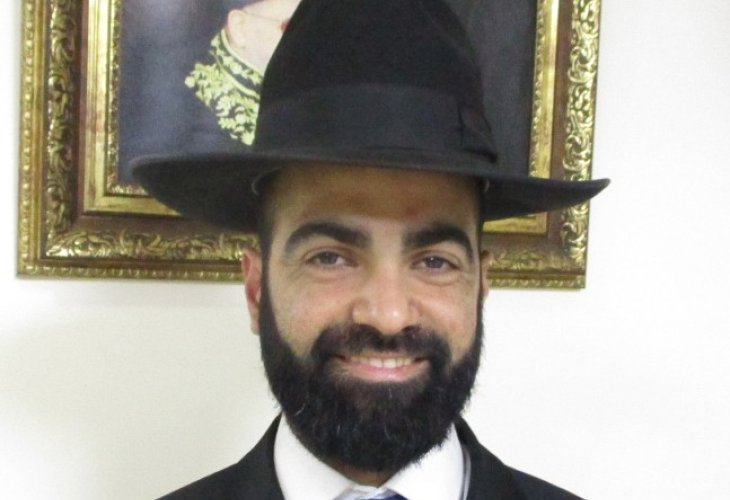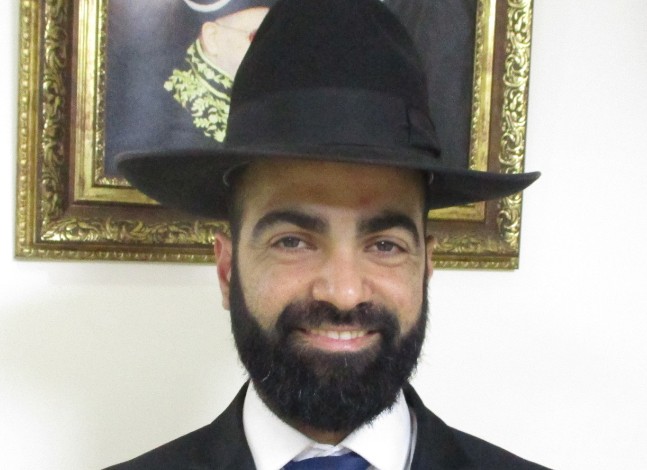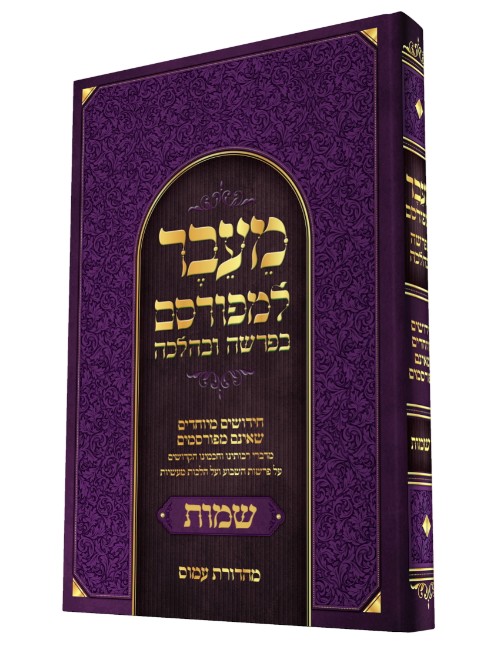"The Most Attractive Options Were Open to Me, But I Chose to Study in a Yeshiva"
Rabbi Yaakov Ma'avari grew up in a secular environment. At 18, he faced a choice between university and an elite military course, but a friend's return to Judaism inspired his own journey to faith. Today, he's an author unveiling the secrets behind his works.

"It might be surprising, but I wasn't born in a Charedi household," says Rabbi Yaakov Ma'avari, a respected scholar and successful author of a series of Torah insights. "I actually grew up in a lukewarm traditional home, and as a teenager, my main focus was sports. I was considered a very successful athlete, especially in tennis, with many competitions in Israel and Europe where I won 39 trophies, 7 medals, and plenty of recognition. Simultaneously, I excelled academically. When I reached military age, I had two main options: the army invited me to a pilot course, which thrilled my father, and Tel Aviv University offered a scholarship for any subject of my choice due to my high scores. My parents were very happy and pushed me to decide. But the Creator had other plans; I strengthened my connection to Judaism thanks to a close friend who left school for a yeshiva a year before. His transformation intrigued me, and after lengthy discussions, I realized it was the truth. Despite all the successful career options open to me, I chose to study in a yeshiva."
Touching the Heart
How do you explain that? Where does an eighteen-year-old find the strength for such a change?
"Clearly, there was great divine assistance; Hashem was helping me," explains Rabbi Ma'avari. "Additionally, I can say that even when I was distant from religion, I was a very honest person, always seeking the truth to the fullest extent. This led me, after doing my own research and understanding where the truth lay, to follow it despite the challenges. Naturally, I didn't immediately find my precise path. I explored yeshivas from the north to the south until I found one that was perfect for my spiritual needs - at Or HaChaim Yeshiva under Rabbi Reuven Elbaz, a member of the Torah Sages Council. I began studying there and b'h was deeply connected."

After a few years of Talmud study, Rabbi Ma'avari decided he needed rabbinical certification. "I threw myself into these studies with all my might, taking every required exam with great effort. In those days, I was already married with children, b'h. It was a busy period, but I didn't give up. I remember myself stopping at traffic lights and using those seconds until the light changed from red to green to review my studies. That was my routine morning, noon, and night, always immersed in learning."
Simultaneously, he began spreading Torah knowledge on a communal level. "I started giving regular lessons in Rishon LeZion, Mevaseret Zion, and different areas in Jerusalem. I taught teenagers, adults, returnees to faith, those who grew up in religious households – very diverse groups. This happened during weekdays, and on Shabbat I was home only for the meals. For the rest of Shabbat, I went from synagogue to synagogue. Over time, I noticed that purely legal lectures didn't always capture the audience's heart. People were sometimes tired and found it hard to focus, even with detailed explanations. Although they enjoyed listening, they struggled to recount the lesson by the Shabbat table because it was too complex. I concluded that a successful lecture needs a unique, brief idea, an unexpected riddle, or an unfamiliar insight. I tried collecting as many such ideas as possible, ultimately amassing a great collection of innovations."
Rabbi Ma'avari notes that throughout his journey, he received proposals to publish his innovations in a book. "At first, this seemed impossible. I never saw myself as someone who writes books. However, as I was prompted more, I began to consider it seriously. Divinely sent in this period was a generous supporter who helps people and rabbis publish books and recordings. Thanks to him, the book materialized. Since its publication, I've been amazed. I receive weekly feedback from people across the country who have read and appreciated the Torah ideas it contains. There have been orders even from Morocco, Spain, France, Holland, England, the USA, Mexico, and more. I was particularly astonished when yeshiva heads from all circles began contacting me with questions about what I wrote. This quickly led to a second book on Shemot. In the coming weeks, a new book on Vayikra will be released, and with Hashem's help, books on Bamidbar and Devarim will also follow once the necessary support is available."
What is the secret of these books? What makes them so special?
"I can say one thing – when I hear a lecture, I seek something that touches my heart. Likewise, when I prepare a lecture, I look for something that will touch others' hearts. This could be through a moving, powerful story, a challenging riddle, or a novel halachic insight. In the book, I divide each Torah portion into four sections – the first always presents an intriguing idea related to the weekly Torah portion. For example, in the Book of Vayikra, I bring forth the novelty regarding the deaths of Aaron's two sons. It is said they died because they drank wine, and the big question is - how could such great individuals, considered greater than Moshe and Aaron, drink wine on the day of the Mishkan's inauguration? I was unsettled until I found a wonderful Midrash explaining they didn't literally drink wine as we understand but nourished themselves with the manna, drinking from Miriam's well. Just as the manna contained all tastes, so could one drink from the well and taste any desired drink. The sons of Aaron didn't drink wine; they drank water from the well but thought about wine, leading to their judgment.
"Next comes the second section, bringing things 'Beyond the Common.' It includes only innovations unknown to most people, questions like: 'What was the name of Pharaoh's second daughter?' or 'Who was the woman before Eve?' or 'Who was Noah's fourth son?' People read these questions and are genuinely curious to know the answers.
"The third section presents halachic questions, like for instance: 'If someone converts and wishes to eat dairy chocolate, remembering he ate meat two hours ago, but at that time was still a gentile – is he allowed to eat because now he is Jewish and six hours haven't passed?' Another question brought before Rabbi Chaim Kanievsky: 'A case of Siamese twins where one wants to convert and the other does not, can only one enter the Jewish nation?' These halachic questions captivate people and spark lively and fascinating Shabbat table discussions.
"Then comes the final section, presenting an inspiring story aimed at elevating readers spiritually and motivating them across various areas. I bring stories from a range of rabbis from all denominations and sectors. I strive for these stories not just to be mere tales but to genuinely awaken hearts and provide true encouragement and personal empowerment because these are things people truly need."

With Blood and Sweat
The responses about the books keep reaching Rabbi Ma'avari repeatedly, and each one brings him joy. "Recently, a mother of an eighteen-year-old boy called me. She said her son left the yeshiva two years ago, which was very painful for them. A few days ago, during the Shabbat meal, he suddenly pulled out the book and started asking questions from it, challenging the family around the table. The mother told me tearfully, 'For two years, my son hasn't spoken words of Torah, and suddenly he spends an entire meal engaged in this, all thanks to you.'"
Could you give us examples of the most interesting innovations published in the book?
"We're talking about the Book of Shemot, so here are a few honey-sweet insights from the current volume: In the book, I raise the question 'How did Bityah, Pharaoh's daughter, name Moshe, when she spoke Egyptian? The answer is she called him 'Munius,' an Egyptian word that translates to 'Moshe.' I also raise the question: 'Who was the only Jewish woman during the Exodus from Egypt who did not sing the Song of the Sea?' The answer is Tzipora, for she was not there. Hence, divinely, she was reincarnated in Deborah the Prophetess, who sang the Song of Deborah."
And he continues: "Who had a private splitting of the Red Sea? The answer is - Dathan and Abiram, because they were not with the Israelites but stayed on Pharaoh's side to inform on the Jews. Eventually, they repented and wanted to join the Israelites. Thus, after the nation had crossed, the sea split for them personally.
"And something amusing - in which country outside of Israel does the holiness of the Land of Israel apply? The answer is in the land of Goshen."
Rabbi Ma'avari gives examples from the section dealing with halachic debates: "I bring in the question: 'What mitzvah must every man fulfill once a year?' The answer is the separation of challah, because even if his wife separates it every week, he must fulfill the mitzvah once a year. Another question that usually fascinates people is: 'Someone who ate in a restaurant and paid for it, should they mention the guest blessing in the Grace After Meals?' The halachic ruling, according to Rabbi Elyashiv and Rabbi Yitzhak Yosef, is yes, he should.
Rabbi Ma'avari also emphasizes his effort to include an entire chapter on remedies and charms from the words of the Sages, such as remedies for ringing ears or baldness, charms for pregnancy, easy childbirth, and more, all gleaned from traditional sources. "One of the fascinating charms I featured was renewed by a contemporary rabbi – Rabbi Mazouz. He says that a cure for flu is eating a hot, cooked potato with black pepper. You learn this because if you write 'tubers with black pepper,' and read the acronyms backward, it spells 'flu.'"
In conclusion, one can't help but ask -where does the rabbi draw all these unique insights from? They seem like things no one has encountered before...
"People assume I use some computer software, but that's not true at all since I have no computer access," Rabbi Ma'avari surprises. "I'll tell the truth – to uncover those insights, I use blood, sweat, and many tears. I'm a simple scholar and don't have all the holy books at home, so I run from study hall to study hall, trying to remember where I saw each thing, sometimes even traveling from city to city just to copy two lines from a book I once encountered. To me, it doesn't matter what the book is; it can be new or old, Yemenite or Ashkenazi, Lithuanian or Chassidic, a pamphlet or a voluminous book, as long as the idea within draws the heart. I believe it's a great merit – to allow people to open their hearts and elevate in awe of Heaven. Sometimes I talk to people who aren't observant and hear from them how they've connected to the novelties I've presented, such as 'where in the Torah do we learn about the Pythagorean theorem?' or 'where do we find methods of calculating the area of a polygon in the Torah?' These are wonderful insights, and it's interesting to see how each person connects to their part."
Rabbi Yaakov Ma'avari's 'Beyond the Famous' books can be obtained atHidabroot Shops
To contact Rabbi Ma'avari: lamefursam@gmail.com

